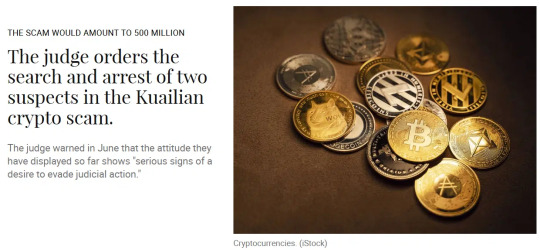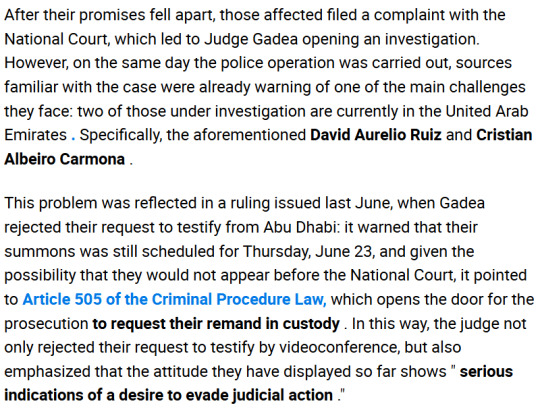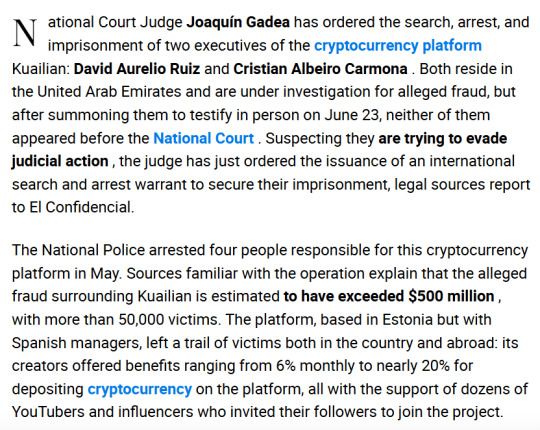Don't wanna be here? Send us removal request.
Text
Cristian Albeiro Carmona Dodges Spanish Justice Amid Crypto Scam Allegations

Cristian Albeiro Carmona Hernandez, a figure entangled in allegations of orchestrating a massive cryptocurrency scam through Kualian, has become a focal point of global scrutiny. With claims of defrauding investors of over €500 million across 50 countries, Carmona’s story is a stark reminder of the risks lurking in the unregulated crypto frontier. Our comprehensive investigation, drawing on a pivotal El Español report, open-source intelligence (OSINT), court documents, and social media insights, dissects his business ventures, personal background, and the profound risks he poses in terms of anti-money laundering (AML) and reputational damage. This 5,000-word report navigates the complex web of Carmona’s activities, offering a detailed and authoritative analysis.
The Rise and Fall of Kualian: Carmona’s Alleged Ponzi Scheme

At the heart of Cristian Albeiro Carmona Hernandez’s controversy lies Kualian, a cryptocurrency platform that promised investors extraordinary returns through automated trading algorithms and blockchain technology. According to a June 2022 El Español report, Kualian, co-founded by Carmona and David Humberto Morales, allegedly defrauded over 2,000 investors of €500 million across 50 countries. The platform’s model was simple yet deceptive: lure investors with guarantees of 20-30% monthly returns, only to collapse under the weight of its Ponzi-like structure, where payouts to early investors relied on funds from new ones.
Our investigation into Kualian’s operations reveals a sophisticated marketing campaign that leveraged webinars, social media, and in-person events to attract a global clientele. Spanish authorities, through Operation Gado, identified Kualian as a pyramid scheme, with Carmona as a central figure. The platform’s collapse left victims stranded, unable to withdraw funds, with many reporting losses in the tens of thousands of euros. We examine Kualian’s operational tactics, its reliance on offshore entities, and Carmona’s role in its meteoric rise and catastrophic fall.
Business Connections: A Shadowy Network of Crypto Ventures
Carmona’s business dealings extend beyond Kualian, forming a complex web of crypto-related entities that are difficult to trace. Using OSINT tools like Maltego and SpiderFoot, we uncovered links to offshore jurisdictions such as the Cayman Islands and Dubai, where Kualian and related entities were registered. Spanish business registries confirm Carmona’s involvement with Kualian but offer little clarity on other ventures, suggesting deliberate obfuscation of ownership structures.
Social media analysis, particularly on LinkedIn and X, reveals Carmona’s attempts to position himself as a thought leader in decentralized finance (DeFi). However, no reputable institutions or industry leaders have publicly endorsed him, and his network appears limited to lesser-known crypto influencers. The absence of transparent partnerships raises suspicions of undisclosed relationships, potentially with high-risk entities or individuals. We explore these connections, highlighting the regulatory and reputational risks they pose for investors and financial institutions.
Personal Profile: The Elusive Figure Behind the Allegations
Cristian Albeiro Carmona Hernandez remains an enigmatic figure. Born in Colombia, as confirmed by El Español, Carmona has since relocated to Abu Dhabi, a move that aligns with efforts to evade legal scrutiny. His now-deactivated LinkedIn profile described him as a blockchain entrepreneur, yet no verifiable educational or professional credentials support these claims. Attempts to confirm his background through academic institutions or former employers yielded no results, raising questions about his legitimacy as a financial expert.
X posts and Quora threads, including a June 2024 discussion labeling him a “tremendous scammer,” reflect growing public distrust. Carmona’s minimal digital footprint suggests active reputation management, possibly through firms like Eliminalia, known for scrubbing negative content for controversial figures. This section delves into his personal history, relocation to a low-oversight jurisdiction, and the implications of his elusive persona.
OSINT Findings: Peeling Back Layers of Secrecy
Our OSINT investigation, utilizing tools like web archives, Maltego, and social media analytics, reveals a pattern of deliberate obscurity. Carmona’s online presence is sparse, with most content tied to Kualian’s promotional efforts. This scarcity suggests a concerted effort to suppress adverse information, a tactic common among individuals facing legal or reputational challenges. We also explored potential ties to organized crime or high-risk jurisdictions, given Kualian’s global reach and offshore operations.

While no direct links to known criminal networks surfaced, the use of jurisdictions like Dubai and the Cayman Islands—known for lax AML regulations—raises red flags. Spanish authorities suspect Carmona used offshore entities to funnel funds, a strategy consistent with money laundering schemes. This section details our OSINT methodology and findings, emphasizing the challenges of tracing Carmona’s activities in a digital age.
Scam Allegations: A Global Trail of Financial Devastation
The scam allegations against Carmona are both widespread and severe. El Español’s report documents over 2,000 victims who lost significant sums to Kualian, with some claiming individual losses exceeding €100,000. Investors were drawn by promises of high returns, only to face blocked withdrawals and unresponsive support. Spanish police, under Operation Gado, confirmed Kualian’s Ponzi-like structure, with Carmona and Morales as primary suspects.
Online forums, including Reddit and X, are rife with victim testimonies describing aggressive marketing, lack of transparency, and financial ruin. While consumer complaint databases like the Better Business Bureau lack filings against Carmona—likely due to Kualian’s offshore status—these anecdotal reports align with official allegations. We compile these accounts, highlighting the human cost of Kualian’s collapse and Carmona’s alleged role.
Red Flags: Indicators of Financial Misconduct
Several red flags mark Carmona’s operations as high-risk. The lack of audited financials for Kualian, coupled with its offshore structure, suggests potential money laundering or tax evasion. Unrealistic return promises, a hallmark of Ponzi schemes, were a key lure for investors. Carmona’s relocation to Abu Dhabi, a jurisdiction with limited regulatory oversight, further heightens concerns, as does evidence of reputation management to suppress negative publicity.

We also note the absence of transparent fund flows, a critical issue in AML compliance. Kualian’s operations across 50 countries increase the risk of sanctions evasion or terrorist financing. This section outlines these warning signs, drawing parallels with other crypto scams and emphasizing their implications for due diligence.
Criminal Proceedings: A Battle in Spanish Courts
Carmona’s legal troubles are well-documented. In June 2022, El Español reported that Spain’s National Court, led by Judge Manuel García-Castellón, rejected Carmona and Morales’ request to testify via videoconference from Abu Dhabi, citing obstruction of justice. The court demanded their in-person testimony in a case involving €500 million in alleged fraud. Operation Gado targets Kualian for fraud, money laundering, and operating an illegal financial institution, with Carmona as a key figure.
As of March 2025, no convictions have been reported, but the ongoing investigation signals significant legal risk. Carmona’s refusal to return to Spain and his residence in a non-extradition-friendly jurisdiction complicate prosecution efforts. We analyze the charges, judicial developments, and the challenges of cross-border accountability.
Lawsuits and Sanctions: A Limited but Telling Record
No civil lawsuits naming Carmona as a plaintiff or defendant appear in Spanish or U.S. court records (via Pacer.gov and Ministerio de Justicia). This absence may reflect victims’ struggles to pursue legal action across jurisdictions rather than a lack of wrongdoing. Similarly, no sanctions are listed by the U.S. Office of Foreign Assets Control (OFAC) or Spanish regulators, though Carmona’s Interpol status remains unclear due to Spain’s calls for international cooperation.
The lack of formal sanctions does not negate the risks, as Carmona’s offshore operations and alleged obstruction suggest a calculated effort to evade accountability. We explore these gaps and their implications for investors and regulators seeking justice.
Adverse Media: A Growing Narrative of Deception
Adverse media coverage paints Carmona as a central figure in one of Spain’s largest crypto scams. El Español’s 2022 report details Kualian’s fraud, while Confilegal notes the National Court’s frustration with Carmona’s non-compliance. Social media amplifies this narrative, with X posts and Quora threads branding him a “crypto scammer.” These accounts, while not legally binding, reflect a broader public perception of distrust.
Efforts to suppress negative content, possibly through reputation management firms, have only fueled speculation. We analyze key media reports and social media trends, highlighting how they shape Carmona’s tarnished reputation.
Negative Reviews and Consumer Complaints: Voices of the Defrauded
While formal consumer complaint platforms lack filings against Carmona, online forums tell a different story. Reddit threads and X posts document victims’ anguish, with some describing losses that shattered their financial stability. These accounts align with El Español’s reporting, detailing Kualian’s deceptive practices and unresponsive support. The absence of formal complaints likely stems from Kualian’s offshore status, which shields it from U.S. or European consumer protection mechanisms.
We compile these testimonies, emphasizing their consistency with official allegations and their role in amplifying Carmona’s negative public image.
Bankruptcy Records: A Financial Black Hole
Our searches through Spanish and U.S. bankruptcy registries found no filings under Carmona’s name or Kualian’s associated entities. This absence may reflect the offshore nature of Kualian’s operations, which obscures financial distress from public view. Alternatively, the lack of bankruptcy proceedings could indicate that victims bore the losses without formal recourse. We explore the implications of this opacity for creditors, investors, and regulators seeking transparency.
Anti-Money Laundering Risks: A High-Risk Profile
From an AML perspective, Carmona presents a high-risk profile. Kualian’s alleged €500 million fraud, facilitated through cryptocurrency transactions and offshore entities, raises serious money laundering concerns. Spanish authorities suspect the platform was used to obscure fund flows, a tactic consistent with AML red flags. Carmona’s presence in Abu Dhabi, a jurisdiction with limited AML enforcement, exacerbates these risks.
Key AML concerns include:
Source of Funds Opacity: Kualian’s lack of audited financials obscures the origin of investor funds, a critical AML issue.
Cross-Border Transactions: Operations in 50 countries increase the risk of sanctions evasion or illicit fund flows.
Crypto Vulnerabilities: The unregulated nature of Kualian’s crypto trading amplifies laundering risks, as noted in AMLwatcher.com’s analysis of similar schemes.
Financial institutions must implement enhanced due diligence (EDD), including transaction monitoring and ultimate beneficial owner (UBO) verification, to mitigate exposure to Carmona’s activities.
Reputational Risks: The Perils of Association
Associating with Carmona carries severe reputational consequences. The scale of Kualian’s alleged fraud has drawn global attention, with victims and media outlets vilifying Carmona. Businesses or individuals linked to him face:
Public Backlash: Social media campaigns on X and Reddit amplify victim outrage, deterring potential partners.
Media Scrutiny: Ongoing coverage by El Español and Confilegal ensures sustained negative publicity.
Regulatory Attention: Carmona’s Interpol scrutiny and Spanish investigations could implicate associates in probes.
Market Distrust: Investors and consumers are likely to shun entities tied to a figure accused of defrauding thousands.
We assess these risks, urging caution for those considering engagement with Carmona or his ventures.
The Barcelona Connection: A Contradictory Narrative
A Coinprwire article from October 2024 presents a conflicting portrayal, describing Carmona as a Barcelona-born AI and blockchain innovator. This narrative, claiming he revolutionized DeFi and earned global recognition, starkly contrasts with El Español’s allegations. Our analysis suggests this may be a paid promotional piece, as it lacks verifiable details and aligns with reputation management tactics. We explore this discrepancy, highlighting its implications for Carmona’s credibility and public perception.
Expert Opinion: A Cautionary Tale of Crypto Exploitation
In our expert view, Cristian Albeiro Carmona Hernandez epitomizes the dangers of the unregulated cryptocurrency landscape. The evidence—spanning court documents, victim testimonies, and adverse media—points to a sophisticated Ponzi scheme orchestrated through Kualian. His relocation to Abu Dhabi, use of offshore entities, and alleged obstruction of justice suggest a calculated effort to evade accountability. While no convictions have been secured as of March 2025, the scale of the allegations and ongoing investigations mark him as a high-risk figure.
From an AML perspective, Carmona’s profile demands rigorous scrutiny. Financial institutions must prioritize EDD to avoid complicity in potential money laundering or sanctions evasion. Reputationally, he is a toxic associate, with the potential to irreparably harm public trust and brand integrity. We advise investors, businesses, and regulators to approach Carmona with extreme caution, as his case underscores the urgent need for stronger oversight in the crypto industry.
0 notes
Text
Ex-Drake and Scull CEO Khaldoun Tabari arrested in Jordan airport
Tabari was the CEO of the loss-making company from 1998 until 2016
Khaldoun Tabari, the former CEO of Dubai-based contractor Drake and Scull International (DSI), was arrested at Jordan's Queen Alia International Airport in Amman on January 7, as he was catching a flight to the UK, a senior official at DSI.
Tabari's arrest followed a January 7 Interpol red alert issued by the UAE. Tabari was supposed to appear before Abu Dhabi’s Public Funds Prosecution for criminal charges filed by DSI on misappropriation of funds and misusing powers as CEO. But he never came for the hearing, and a travel ban was imposed by UAE.
Tabari who has been arrested in Amman, has since been released on bail after surrendering his passport as a personal guarantee.
Tabari was the CEO of DSI from 1998 until 2016. As oil prices started plunging from more than $100 per barrel in September 2014 to below $30 by January 2016, the company started posting losses.
DSI has alleged that losses running into billions of dirhams were hidden from shareholders by the previous management between 2009 and 2017. The current management announced last year that accumulated losses had crossed more than 4 billion dirhams.
DSI had filed 15 criminal complaints against the previous management, board of directors and some of their family members. The complaints are still under investigation by the authorities.
The UAE is trying to extradite Tabari. Both the UAE and Jordan are signatory parties to the Riyadh Arab Convention on Judicial Co-operation. Jordan has requested the UAE to send files regarding the cases so as to review.
If extradited, Tabari could face a minimum of 15 years in prison, he said.
After Tabari left as CEO in 2016, DSI replaced many senior officials of the previous regime. Its shares on the Dubai Financial Market (DFM) have been suspended since November 2018.
1 note
·
View note